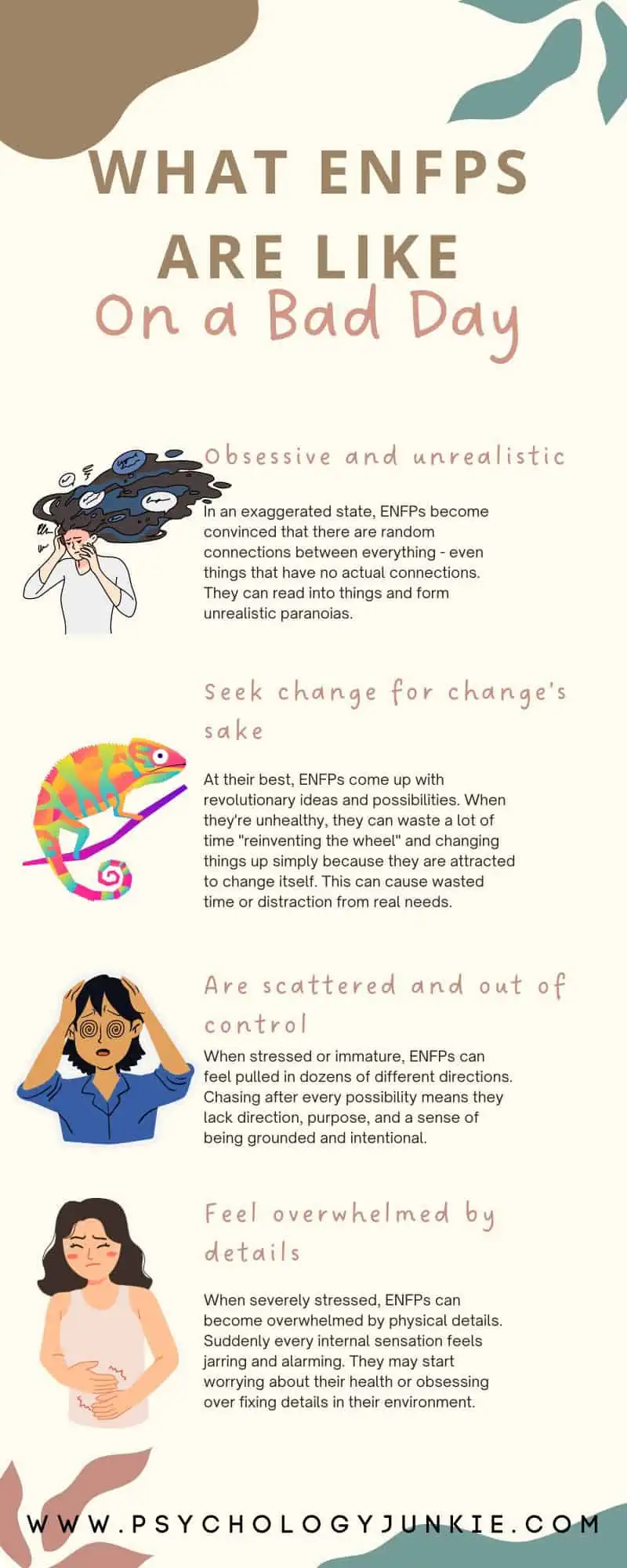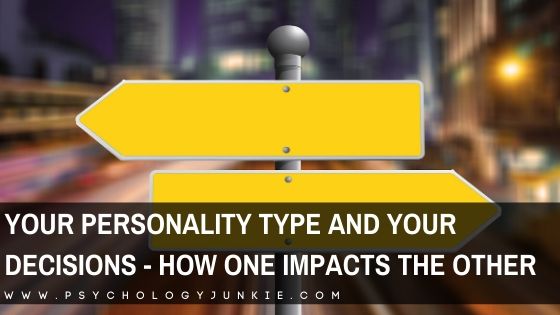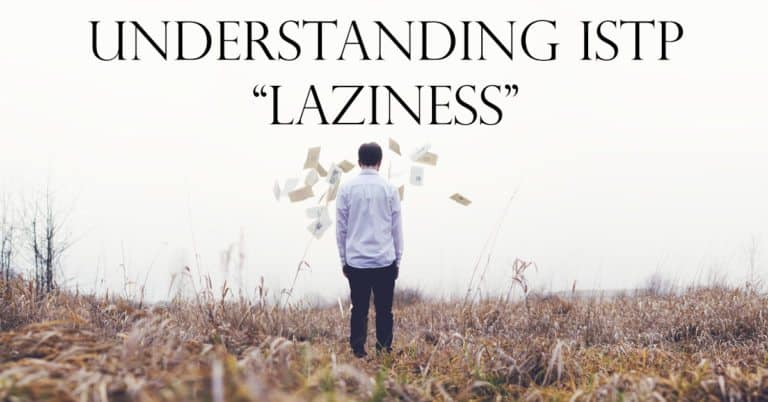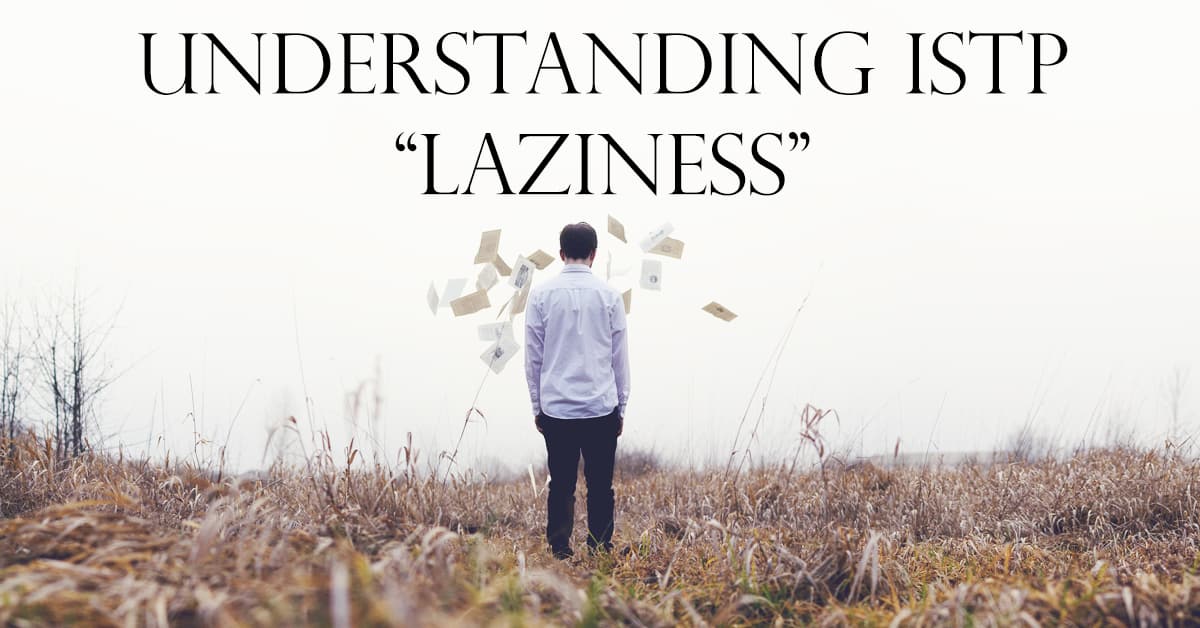The Dark Side of the ENFP Personality Type
For the ENFP, life is a series of exciting adventures, possibilities, and discoveries. Curious and imaginative, they enjoy exploring new and novel ideas. When in the ENFP’s presence, you may feel like you’re surrounded by light and enthusiasm. However, ENFPs can become unhealthy and cause harm to themselves or those around them when they are unhealthy, immature, or imbalanced.
What Does ENFP Mean?
The ENFP is one of the 16 Myers-Briggs® personality types. The code “ENFP” stands for Extraverted, Intuitive, Feeling, and Perceiving. You can get a quick overview of the ENFP personality type here.

Not sure what your personality type is? Try out our most highly recommended personality questionnaires:
- You can take our free personality questionnaire here
- You can take Personality Hacker’s personality questionnaire.
- You can take the official Myers-Briggs Type Indicator® for $49.95
This article contains an affiliate link to a questionnaire on Personality Hacker. If you purchase one of their courses, I get a small kickback that I can use to pay for hosting and other demands of this site. I only recommend courses I love.
The Many Ways a Dark Side Can Show Up for the ENFP:
Everyone has a dark side. No matter what your personality type is, you can become unhealthy or unbalanced.
Most commonly, the dark side of an ENFP shows up when they are:
- Stressed
- One-sided
- Immature
- Overwhelmed
- Feeling trapped
- Feeling unappreciated
- Operating outside their strengths
The Stressed ENFP:
“People will do anything, no matter how absurd, to avoid facing their own souls.” – Carl Jung
We all experience certain symptoms of stress. Raised blood pressure, muscle tension, stomach distress – these things are unavoidable. But there are other things more specific to the ENFP personality type that can show up during moments of extreme stress.
When ENFPs first encounter stress, they try to solve it by finding the positive side to the problem. Is there a hidden blessing in the challenge? Is there a new possibility presented by the challenge? Looking for the bright side is often the first thing an ENFP will do. Secondly, they may try to calm things down so they can tune into their heart and see what their emotions are telling them. Do they need to be alone? Do they need to talk to someone? What do they need emotionally? Can they define their feelings?
However, if stress only continues or increases, ENFPs can encounter something called “grip stress.” During grip stress, ENFPs often become pessimistic, irritable, and anxious. They may develop tunnel-vision, feeling that there is only one solution to the problem at hand. Alternatively, they may become overwhelmed by feelings of physical hyper-awareness. It’s not unusual for ENFPs in the grip to become anxious about physical signals, or hyper-aware of every single detail in their bodies.
Things That Cause Stress for ENFPs:
- Having their life too planned out and regimented
- Having to follow a bunch of rules that seem meaningless
- Focusing on repetitive, detailed tasks
- Restrictions on brainstorming or envisioning the future
- Criticism or disharmony
- Having to rush through a project
- Overextending themselves
- Not getting enough time with people
- Having to rush to make a decision
The One-Sided ENFP:
ENFPs are extroverts, but they also have an introverted side. When ENFPs hyper-fixate on the extroverted side of their personality, they can lose touch with their values, integrity, and personal well-being. ENFPs are driven to explore many possibilities and ideas, but at times they can be so seduced by a new idea or opportunity that they leave other projects unfinished. They may also resist obligations or mundane duties to chase after something new and shiny. This can look as severe as neglecting your children because you’re chasing a new possibility or as benign as skipping flossing your teeth because it’s boring and you’ve got better things to do. ENFPs who are one-sided become so entranced by new possibilities and ideas, that they leave many valuable things in the past.
The Immature ENFP:
ENFPs at their best are open-minded, thoughtful, and driven to create positive change in the world. ENFPs at their worst can be irresponsible, careless, and rebellious. ENFPs may struggle with commitment, feeling that it ties them down or limits their potential. They may also avoid responsibility for fear of being seen as inflexible or uncreative. Immature ENFPs may take little to no responsibility for their actions or even blame others for their circumstances. They may rationalize away any consequences of their choices, which can lead to poor decision-making and a lack of personal growth.
Being Unappreciated:
ENFPs thrive on being appreciated and valued. Like anyone else, they want to be recognized for their contributions. But some people don’t appreciate the ENFP’s personality strengths. They see their enthusiasm as flaky, their sensitivity as overly emotional, their imagination as unrealistic, and their spontaneous lifestyle as undependable. ENFPs can feel crushed by these perceptions of them, especially if the people making these judgments are in their families. Over time, ENFPs may even buy into this false narrative about who they are and become less enthusiastic and creative because of it. They may stifle their strengths, becoming depressed and cynical as a result. They may also overextend or exhaust themselves, trying to be everything to everyone else instead of who they actually are.
The Self-Righteous ENFP:
ENFPs are very independent and have strong convictions about what is right and wrong. When they’re unhealthy, they can believe that their values and ethics should be adopted by everyone. Anyone who doesn’t align with their beliefs is simply wrong. This can look like having little to no patience for people with different political or religious affiliations, or making self-righteous rants towards people without taking the time to see the context of their life situations. ENFPs in this state can become preachy and unyielding, creating tension and conflict with those who don’t agree with them.
Healthy ENFPs are open-minded and curious about people with different views. They realize that before a person enters their life, they’ve experienced literally thousands of things that have shaped who they are. They know that life is comprised of stories, and we only know a fraction of a percent of someone’s story. Because of this, they are slower to judge than most people and are interested in getting a real look at who someone is and why they are the way that they are.
4 Ways for ENFPs to Grow:
- It’s important to make time for the extroverted and introverted sides of your personality type. Make time for socializing, brainstorming, and creating with others. But also make time to check in with yourself, learn, and reflect. When you take time to form connections with others while also becoming more self-aware, you become more mature and balanced. This leads to a more purposeful lifestyle.
- As an ENFP it’s natural to feel pulled by dozens of different possibilities and ideas. But before you jump to another project or distraction, ask yourself, “Will I feel good about this at the end of the day?” You can also look at your responsibilities or the people depending on you and ask yourself whether you are making a decision you can feel good about in your heart. Checking in with your heart and making sure you’re aligned with your values is crucial to making good decisions.
- Most ENFPs are open-minded and non-judgmental, but if you’re unhealthy, you can start to make snap judgments of others. Especially if those other people hold different values from your own. Read books about people from different walks of life, communicate with a variety of people with different lifestyles, and continue learning about the varieties of human experience. The more you know and understand, the less you’ll be tempted to judge others harshly.
- When stressed, check in with yourself to see what you need. Get some time alone to focus on your breathing, clench and unclench every muscle in your body, and slow your racing thoughts. Take a walk in nature, meditate, pray, or take a nap. You can find more information about stress specific to ENFPs here (as well as get more solutions).
What Are Your Thoughts?
Did you enjoy this article? Do you have any thoughts or experiences to share? Let us and other readers know in the comments! Find out more about your personality type in our eBooks, Discovering You: Unlocking the Power of Personality Type, The INFJ – Understanding the Mystic, The INTJ – Understanding the Strategist, and The INFP – Understanding the Dreamer. You can also connect with me via Facebook, Instagram, or Twitter!













Shadow side might be more of an appropriate title.
Thank you for taking time and consideration to write this, truly ❤️ the analysis and explanation of the bad days and their symptoms was spot on, will definitely take heed and adjust accordingly when noticing any of them pop up as they tend to do sometimes. Very valuable stuff here, thanks again 😌✌️